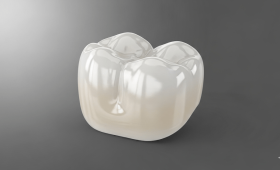What is a Dental Crown and When is it Used?
A dental crown is an artificial “cap” placed over a weakened, broken, decayed, or misshapen tooth, completely enveloping and protecting it. This treatment is applied to restore both the aesthetic appearance and function of the tooth. Crowns are preferred for various reasons, such as strengthening teeth that have undergone root canal treatment, providing support for bridge prosthetics, covering implants, and closing gaps between teeth. They come in different types based on the material used, each offering distinct advantages. A dental crown provides a long-lasting solution while preserving the original structure of the tooth.
Why is Getting a Dental Crown in Antalya an Attractive Option?
Antalya is a globally prominent center for dental tourism. The reasons for its popularity include clinics with modern technology, expert and experienced dentists, and services that meet Western standards. At the same time, thanks to the advantages of exchange rates, it offers high-quality treatment at much more affordable prices compared to Europe and other countries. During the treatment process, patients also have the opportunity to vacation and explore the city, turning dental treatment into a health tourism experience.
Why Do Dental Clinics in Antalya Offer More Affordable Prices?
The primary reason for the more affordable prices for dental crowns in Antalya is that the overall cost of living and operating expenses are lower compared to many European countries. Additionally, the exchange rate difference creates a cost advantage for patients coming from abroad. The high volume of patient traffic in dental clinics also provides economies of scale in material procurement. When all these factors are combined, high-quality services can be offered without compromising on quality.
What is Included in the Price of a Dental Crown?
The price of a dental crown is usually clearly explained to the patient before the treatment begins. This price typically includes all stages, such as tooth preparation, impression taking, temporary crown placement, the laboratory process, and the final cementation of the crown. Pricing varies depending on the crown material used (zirconium, porcelain, E-max, etc.), the number of teeth to be treated, and any additional needs (e.g., root canal treatment or tooth extraction). In reliable clinics, additional costs are specified in advance to avoid surprises.
What is a Metal-Supported Porcelain Crown?
Metal-supported porcelain crowns are a type of crown with a metal alloy base, over which porcelain is layered to provide an aesthetic appearance. Due to the durability provided by the metal, these crowns are often preferred for back teeth where chewing forces are high. Although they are durable, their light transmission is lower than that of zirconium or all-porcelain crowns, and they can create a gray reflection at the gum line. Therefore, they stand out as a more economical alternative in cases where aesthetic expectations are not very high.
What is a Zirconium Dental Crown?
Zirconium dental crowns are produced from zirconium, a metal-free, white, and biocompatible material. The biggest advantage of zirconium is that it offers a highly aesthetic appearance very close to that of a natural tooth and has light-reflecting properties. This makes it an ideal choice for front teeth and in situations where high aesthetic expectations are present. It is also a very strong and durable material, so it can be used safely on back teeth as well. It does not create aesthetic problems like a metal reflection at the gum line.
What is an E-Max Dental Crown?
E-max dental crowns are a type of all-porcelain crown made from lithium disilicate glass-ceramic, offering a combination of high light transmission and durability. These crowns provide the most natural aesthetic appearance. Especially for front teeth, excellent transparency and brilliance can be achieved even with a thin crown. Since it is metal-free, there is no risk of allergy, and it is a biocompatible material. Thanks to its strength, E-max is resistant to breakage even with a thin structure, which requires minimal tooth reduction.

Which Type of Dental Crown is Best for Me?
The most suitable type of crown is determined after a detailed examination and consultation with your dentist. Factors such as the location of the tooth (front or back), your aesthetic expectations, your budget, gum health, and the condition of the tooth are influential in the decision-making process. For example, since aesthetics are more important for front teeth, zirconium or E-max are preferred, while for back teeth, where durability is more crucial, zirconium or metal-supported crowns may be considered. Your dentist will evaluate all these variables to offer you the best option.
How Long Does Dental Crown Treatment Take in Antalya?
Dental crown treatment in Antalya is usually completed within two to five days. This duration can vary depending on the technology used by the clinic (e.g., CAD/CAM systems) and the number of teeth to be treated. In the first visit, the teeth are prepared and impressions are taken. In the second visit, the fit of the crowns is checked, and the final placement is done. This quick process allows patients from abroad to combine their treatment with a short vacation.
Is Pain Felt During the Crown Application?
Dental crown application is usually performed under local anesthesia, so there is no pain or discomfort during the procedure. The area is completely numbed during the preparation and shaping of the tooth. When the effect of the anesthesia wears off, a slight sensitivity or pain may be felt, but this usually subsides on its own within a few days or can be easily controlled with over-the-counter pain relievers. Thanks to modern dental techniques, the process has been made quite comfortable.
How Many Days Do I Need to Stay in Antalya for Crowns?
The duration of stay for dental crown treatment in Antalya generally depends on the treatment plan. It is usually recommended for patients to stay for at least 4-5 days. During this period, the initial examination and tooth preparation are done on the first day, followed by the laboratory process. In the days in between, the patient can enjoy the city. The final days are for the trial and final placement of the crowns. Within this short period, both the treatment is completed and patients get the opportunity to have a vacation.
What is the Dental Crown Treatment Process Like?
Crown treatment consists of several stages. First, a comprehensive examination is performed by the dentist, and a treatment plan is created. Then, local anesthesia is applied to the tooth, and it is shaped by reducing its size for the crown. After that, a precise impression of the tooth is taken and sent to the laboratory. In the laboratory, custom crowns are produced for the patient. During this time, temporary crowns are placed. Finally, the permanent crowns are checked by the dentist and cemented onto the tooth with a special adhesive.
What is the Lifespan of Dental Crowns?
The lifespan of dental crowns depends on the material used, the patient’s oral hygiene, regular dental check-ups, and the care given to the crowns. Generally, high-quality crowns like zirconium and E-max can last between 10 to 15 years. This period can even be extended with good care. To increase the durability of the crowns, it is important to avoid biting hard foods and to practice regular brushing and flossing.
Do Dental Crowns Look Like Natural Teeth?
Yes, modern dental crowns, especially when aesthetic materials like zirconium and E-max are used, provide a realistic appearance that is indistinguishable from natural teeth. These materials reflect light just like natural teeth and adapt to the structure of the tooth. Through the collaboration of the dentist and technician, the size, shape, and color of the crowns are adjusted to best suit the patient’s facial structure and other teeth. This results in a natural and aesthetic smile.
What Should I Consider Before Getting a Dental Crown?
Before dental crown treatment, it is very important to have a detailed oral examination. Your dentist will ensure that any gum disease, decay, or other oral health issues are resolved before the crown treatment. You should also research the experience of the clinic and the dentist you choose, as well as the technology they use. It is also important to pay attention to previous patient reviews and the treatment warranty conditions offered by the clinics. Make sure there is a clear plan regarding the treatment process and costs.
What is the Aftercare for Dental Crowns?
Regular and proper care is crucial for the longevity of dental crowns. You should treat crowns like your natural teeth, brushing at least twice a day and flossing daily. Cleaning the interdental spaces of the crowns with special interdental brushes or a water flosser can be beneficial. It is necessary to avoid consuming very hard and sticky foods and to stay away from habits that can damage the crowns (e.g., nail-biting, chewing on pens). Furthermore, a regular dental check-up every six months is vital to monitor the condition of the crown.
Can People with Gum Problems Get Crowns?
Yes, individuals with gum problems can also get dental crowns, but the gum disease must be treated first. Untreated gum inflammation (gingivitis) or more advanced periodontitis can negatively affect the success of the crown application. Before the dental crown, the dentist will apply necessary treatments (e.g., dental cleaning, scaling) to restore gum health. Healthy gums ensure that the crowns fit the teeth perfectly and that the aesthetic appearance is preserved.
How to Find a Reliable Dentist in Antalya?
To find a reliable dentist and clinic in Antalya, a few important steps can be taken. First, you can check the clinic’s website and social media accounts to look at their references and reviews from previous patients. It is important to get information about the technological equipment, hygiene standards, and the dentist’s experience. Do not hesitate to contact the clinic before the treatment to ask your questions and get transparent information about the entire process. Dentists who are members of professional associations or have international certifications can be a good indicator of reliability.
Does the Color of Dental Crowns Change Over Time?
Modern dental crown materials like zirconium and all-porcelain are highly resistant to staining and color change. These crowns have a less porous surface compared to natural teeth, so they are not affected by external factors like tea, coffee, and cigarettes. However, there may be a minor change at the gum line over time, which can be easily managed with regular check-ups. Professional cleaning by a dentist helps to maintain the brightness and aesthetics of the crowns.
Do Dental Crowns Fall Off or Break?
It is a rare occurrence for a properly placed and well-made dental crown to fall off or break. Crowns are cemented onto the tooth with a special strong adhesive and are designed to withstand chewing forces. However, extreme forces like biting very hard foods, teeth grinding, or accidents can damage the crown. If a crown falls off or breaks, you should contact your dentist as soon as possible, as it is important to re-protect the tooth.
Do Dental Crowns Cause Allergies?
Dental crowns made from biocompatible materials like zirconium and all-porcelain have a very low risk of causing allergic reactions. These materials are compatible with the human body, so they generally do not cause problems. However, some people may have allergic reactions to metals like nickel used in the substructure of older-style metal-supported porcelain crowns. Therefore, if you have a history of allergies or prefer a metal-free crown, you should definitely share this with your dentist.
Is There an Age Limit for Crown Treatment?
Dental crown treatment is generally suitable for individuals whose tooth and jaw development are complete. This usually means individuals aged 18 and older. In children and teenagers whose tooth and jaw structures have not yet completed their development, crown application is not recommended as it may affect the growth and maturation process of the tooth. However, in exceptional cases and with the dentist’s decision, it can be applied at a younger age.
Can a Crown Be Made for a Single Tooth?
Yes, making a crown for a single tooth is a very common procedure. A crown can be used to restore the appearance and function of a single tooth that is broken, has severe decay, has changed color, or is misshapen. Since the single-tooth crown is colored to match the natural teeth, it is not noticeable and an aesthetic result is obtained. This is a quick and effective solution for improving a smile’s aesthetics.
Is it Possible to Get Crowns for More Than One Tooth?
Yes, it is possible to get crowns for more than one tooth, and this is often applied in comprehensive treatments like aesthetic smile design. Especially if there are color or shape irregularities in all of the front teeth, crowning several teeth at once provides a more holistic and harmonious result. The dentist will make special measurements and designs to ensure that all teeth are in harmony with each other. In this process, the patient’s expectations are also taken into account to achieve the most natural look.
Is a Crown Necessary for a Tooth That Has Had Root Canal Treatment?
Teeth that have undergone root canal treatment are usually weakened and more prone to fracture. Therefore, it is widely recommended to place a crown after root canal treatment to protect and strengthen the tooth. The crown sits on the tooth like a shield, protecting it against chewing forces and preventing a possible fracture. Without a crown, the tooth’s risk of fracture may increase over time. This can lead to more costly and complex treatments in the long run.
Is There Tooth Sensitivity After Crown Treatment?
It is normal to experience a slight hot-cold sensitivity for the first few days after a dental crown is placed. This may be due to the process of preparing the tooth for the crown. The sensitivity usually lessens on its own within a few days. If the sensitivity persists for a long time or increases, it is important to contact your dentist. Issues such as the crown not fitting perfectly or a problem with the gum can cause sensitivity, and your dentist can easily fix this problem.
How are Accommodation and Travel Arrangements Made in Antalya?
For patients planning to get dental treatment in Antalya, clinics usually provide support with travel and accommodation. Many clinics offer services such as airport transfers and special accommodation rates at partner hotels. These services aim to make the patient’s treatment process more comfortable and stress-free. Before the treatment, you can contact the clinic you have chosen to get information about this kind of logistical support and plan your travel accordingly.
Is a Warranty Provided by Dental Crown Centers in Antalya?
Yes, many reputable dental clinics in Antalya offer a warranty for a specific period for the dental crowns they apply. This warranty covers free repair or replacement services in cases of crown cracking, breaking, or falling off. The warranty period and conditions may vary depending on the clinic and the material used. Therefore, it is important to clarify the warranty terms and duration in writing with the clinic officials before starting the treatment. The warranty is an important guarantee for the long-term success of your treatment.
Which Crown Type Provides the Most Aesthetically Successful Result?
The most aesthetically successful result is generally achieved with zirconium or E-max (all-porcelain) crowns. These materials, thanks to their ability to mimic the light transmission and transparency of natural teeth, offer a realistic and natural look. Unlike metal-supported porcelain crowns, they do not create a gray reflection at the gum line. Zirconium combines durability and aesthetics, while E-max provides superior aesthetics and transparency, especially for front teeth. The choice depends on the patient’s expectations.

When Should Crowns Be Replaced?
Dental crowns need to be replaced when they have reached the end of their lifespan, are aesthetically unsatisfactory, or when new decay forms underneath them. If a crack, break, or color change occurs in the crown, it may need to be replaced. Also, if a gap forms at the gum line due to gum recession or if the tooth under the crown decays, these are also reasons for replacement. Regular dental check-ups help in the early detection of such problems.
What Are the Ideal Dental Health Conditions for Dental Crown Application?
Ideally, the patient’s oral and gum health should be good for the dental crown application. If there is any decay or gum disease (gingivitis or periodontitis), these problems must be treated first. It is important that the root of the tooth to be crowned is solid, the gums are healthy, and the tooth structure is sufficient. The dentist will perform a comprehensive examination to ensure that the tooth to be crowned meets these conditions.
How to Make an Appointment for Crown Application in Antalya?
Making an appointment with dental clinics in Antalya is usually an easy process. Most clinics accept online appointment requests via their websites or social media accounts. You can also contact them by email or phone to get detailed information and set up an appointment. For patients from abroad, clinics usually offer online consultation services, so you can have your condition evaluated and a treatment plan created before you travel.
Is a Temporary Crown Necessary During Dental Crown Application?
Yes, during dental crown treatment, it is important to use temporary crowns to protect the tooth and maintain its aesthetic appearance while the permanent crowns are being prepared. Temporary crowns help protect the tooth from hot and cold sensitivity until the permanent crowns arrive. They also maintain the shape and position of the tooth and provide an aesthetic transition period. These temporary crowns play a critical role in making the treatment process comfortable.
When Can I Return to My Normal Life After a Dental Crown?
You can return to your normal life immediately after the dental crown is placed. There may be a slight sensitivity or an adjustment period after the procedure, but this usually subsides within a few days. Since the crowns will function like natural teeth, you can immediately return to your normal eating and speaking habits. Your dentist may advise you to avoid very hard and sticky foods for the first few days, but this is only for a short period.
How Should I Floss and Brush After Getting a Crown?
Your oral hygiene routine after a crown is no different from the one you apply for your natural teeth. You should brush your teeth at least twice a day and floss once a day. The areas where the crowns meet the gums can be sensitive to plaque buildup, so special attention should be paid to these areas. Regular brushing and flossing help prevent decay in the tooth under the crowns and gum inflammation.
Is Dental Crown Treatment Done in a Single Session?
Dental crown treatment is generally not completed in a single session; it requires multiple visits. In the first visit, the teeth are prepared, impressions are taken, and temporary crowns are placed. The production of the permanent crowns in the laboratory may take a few days. In the second visit, the fit and aesthetics of the crowns are checked, and the final cementation is done. This duration can be shorter or longer depending on the technological infrastructure of the clinic.
What Technologies are Used in Dental Crown Treatment?
Many modern dental clinics in Antalya use the latest technologies in dental crown treatment. These include digital intraoral scanners (3D scanners) for precise impression taking, CAD/CAM (Computer-Aided Design/Computer-Aided Manufacturing) systems that speed up the design and production of crowns, and special milling machines that produce high-quality crowns. These technologies make the treatment process faster, more precise, and more comfortable.
Do Crowns Harm the Gums?
Properly designed and placed dental crowns do not harm the gums. On the contrary, a well-fitting crown can protect the gums and prevent plaque buildup. A perfect fit of the crown at the gum line is vital for maintaining healthy gum tissue. A poorly designed or badly placed crown, on the other hand, can cause gum inflammation and recession, which is why it is very important to choose an experienced dentist.



